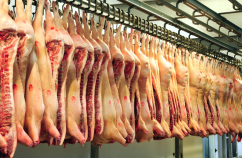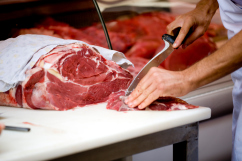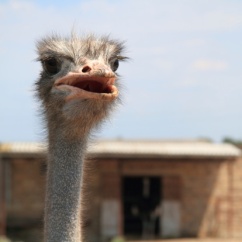Meat News
Pig prices have fallen to their lowest point since April 2013, as higher supplies and subdued demand have combined to produce a similar picture to that in the sheep meat and cattle sectors.
Bpex said that for the week ended 26 July, the UK-spec DAPP fell to 158.02p per kg, marking a decline for the fourth consecutive week.

AHDB Market Intelligence’s Stephen Howarth told meatinfo.co.uk that domestic production is high, with more pigs and higher carcase weights pushing up supply. He said the breeding herd had stabilised, with improved productivity due to mild weather.
Howarth added that there are more pigs coming in from abroad: “European pig prices are quite a bit lower than ours which has pulled some extra imports in.
”The increased supply has been met with subdued UK demand. Despite good barbecue weather, Howarth told meatinfo.co.uk that this has only slight offset the negative impact of this year’s mild climate, which is not conducive to the consumption of the higher value pork products – frying and roasting cuts.
He added: “I think people are still in a mind state that they have been in for the last few years and watching the pennies.
”However Howarth was also keen to stress that current prices are still historically quite high, and would have been at record levels 18 months ago. He said exports have been steadily rising over the last three years, despite the strengthening of the pound. Feed prices are also low, which helps with producers’ margins.
Moy Park has announced its grower expansion programme in Northern Ireland has been a success, with over 250 new poultry houses planned for completion by the end of 2015.
Moy Park explained that it had embarked on the programme, which was launched at the end of last year, as part of the business’ plan to grow its fresh, locally farmed chicken supply for its UK and Ireland customers. It reported that 90 houses were either built or nearing completion.
Alan Gibson, Moy Park director, said: “This expansion is in response to what we believe is a long-term demand from both retailers and consumers for fresh, locally sourced poultry. We currently work with 800 of the very best poultry farmers and we are pleased with the response we’ve had to our call for growers in Northern Ireland to expand poultry production.
“We currently have over 250 new poultry houses in the programme but we are still looking for growers in proximity to our two main primary processing sites in Ballymena, Co Antrim and Dungannon, Co Tyrone, who want to expand or move into poultry production.”
Moy Park said its expansion programme has included a recently announced £170m investment and the creation of 628 jobs in Northern Ireland. It appealed to farmers to continue to help expansion: “The growth opportunity is open to both existing poultry growers and suitable new farmers in Northern Ireland. Moy Park is inviting those interested to come forward to find out how they could qualify for the programme to build new broiler and breeder houses and become part of one of Europe’s most successful poultry businesses.
The scheme sees a Moy Park Agri Team helping farmers to invest and expand in their business, as well providing help and guidance for new farmers starting out in the industry. As part of this, the company was instrumental in getting a government Agri-Food Loan Scheme up and running.
Beef, lamb and pig meat production has increased on last year, according to the latest slaughter figures from Defra.

The figures compare June 2013 with June 2014 and show clean sheep slaughterings – which refers to animals that have been bread purely for slaughter – at 907,000 head for the month, just over 8% higher than in June 2013, while mutton and lamb production was at 21,000 tonnes, 5% higher than in June 2013.
Clean pig slaughterings were 3.7% higher than last June at 772,000 head and pigmeat production was 6% higher at 64,000 tonnes.
Although prime cattle slaughterings were down 0.5% and 150,000 head this year, beef and veal production was almost 3% higher than June 2013 due to continuing heavy carcass weights, according to Defra.
Stephen Rossides, director of the British Meat Processors’ Association, commented on the cattle figures: “Overall [there was] lower beef production in June. But I think for a fuller picture of the market, a longer time frame needs to be taken, as well as trends in imports, exports, retail demand and weather factors.”
Defra said the report is subject to revision in August when they will publish the updated figures.
Another meat body has expressed its concern at the fall in lamb prices as supply increases.
After Quality Meat Scotland (QMS) reported a cooling of lamb prices, Hybu Cig Cymru – Meat Promotion Wales (HCC) has joined the discussion, confirming that a greater number of lambs have come into market earlier than usual. Like QMS, HCC has also cited the strong pound against the euro as a contributor to the problem.

The UK beef industry has already been suffering from a farmgate price crisis, and summits have been held to find solutions.
John Richards, HCC’s industry information executive, said: “This year, thanks to a good lambing season and mild weather, there is a significant increase in the number of lambs now reaching the market. It must also be borne in mind that lambs are entering the market earlier this year, extending the season. It means that the traditional seasonal trend has occurred a few weeks earlier in comparison to other years.”
HCC said the falling lamb price highlights the importance of diversifying exports. Richards added: “This reinforces HCC’s strategy of looking for other markets around the world, so that we are not entirely dependent on one currency for our export trade. We are already exporting Welsh Lamb to the Middle and Far East, as well as Scandinavia and Canada, while working to gain entry into new markets including China and the USA.”
Thursday night’s SuperMeat & Fish Awards celebrated the best British supermarkets have to offer, with Tesco winning overall retailer of the year.

Tesco took home the title of Meat and Fish Retailer of the Year as well as the Head office Initiative Award.
Head judge Fred A’Court, who was impressed with the Tesco stores, said: “A high level of consistent quality in its product range, allied to attention to detail and good availability throughout its stores helped Tesco to a good win in this year’s awards. It is now making progress in creating warmer, friendlier and distinctive shopping zones in some of its stores that make customers feel comfortable and relaxed while they shop.”
Attending the prestigious event in central London Mark Green, who collected the overall retailer award for Tesco told Meatinfo.co.uk: “This is the award we wanted and why we entered.“ Tesco are committed to develop and train staff and our fresh food capability sets us apart. From a head office perspective we are committed to train our staff, over the course of the year we have trained 3,000 colleagues on how to skin our meat and fish, right through to the finished product. We are really proud of the products we sell and the service that we offer our customers.“ When you look at the competition whether it be Aldi, Lidl or Morrison’s, everybody has done a great job and it is extremely competitive, so we are extremely proud to come out on top.” Ed Bedington, editor of Meat Trades Journal which organised the awards, said: “Many congratulations to Tesco – a most deserved win. The results, which saw Tesco perform consistently well throughout, show the amount of work the retailer has been doing to improve its quality.”
A total of 13 product awards and seven regional store awards were given out at the glitzy event presented by musician and television personality Myleene Klass.

Best Overall Product was awarded to Marks & Spencer for its Steak and Old Peculier Ale Pie. Morrisons Camden scooped two awards for Best Store Team and Best Meat Counter, while Tesco Superstore, Launceston, Cornwall was awarded Best Fish Counter. The most innovative product was given to Tesco for its Beef Lollipops with a Cherry BBQ Sauce.
This year’s ceremony also played host to the Tri-Nations Butchery Awards, held earlier in the day at the Great Yorkshire Show. This saw top butchers from Great Britain, Australia and New Zealand go head-to-head for the title. The Kiwis were crowned champions for the second consecutive year.
Bedington added: “This competition is a great showcase for the supermarket sector, and this year was no different, with a superb range of entries and a close-fought battle for every category. We look forward to seeing how Tesco defend their title next year, as I know the other retailers will be itching to get their hands on the crown.”
Research suggests that online shopping is the way forward for butchers, with turnover from online retail expected to rise 175% in five years.

A study into the independent retail sector, commissioned by Eblex, showed that currently relatively few butchers sell online – total butcher’s shop sales are estimated to be worth £2.24 billion annually, but just 0.2% of this is accounted for by online sales. Only 8% of butchers currently offer online shopping, with those shops averaging three orders and an average sales value of £61 a week. However, Eblex said that large growth is expected in this area.
Matthew Southam, Eblex multiple retailer account manager, explained: “This survey provides revealing insight into the butcher’s shop sector and, in particular, the online marketing opportunity. When compared to other food businesses the proportion of turnover accounted for by online sales is quite low for butchers. While that’s to be expected in a sector which prides itself on personal service and where customers want to see and learn about the product they are buying, there is untapped potential for progressive butchers.
“The potential is huge: online retailing is an area that continues to grow as consumers change the way they purchase goods and butchers who offer an online shopping facility stand to benefit. We expect annual online sales to increase by 175% to more than £11m in five years as consumer demand increases and greater numbers of butchers embrace the e-commerce space and offer their customers an alternative, more convenient means of buying their meat.”
The research also suggested a lack of online presence generally within the sector: 67% of surveyed butchers didn’t have a company website. Furthermore, around half said they had no intention of developing a website, giving reasons such as “it would be too difficult”, “no time to deal with a website” and “don’t have a need for one”.
Southam added: “There is perhaps a perception that setting up and maintaining a website needs to be a time-consuming and expensive undertaking. That doesn’t always have to be the case. At Eblex, we are increasingly developing online tools and resources which are designed to help butchers to build their business and make the most of marketing opportunities.
“We recently launched an online image library (www.eblextrade.co.uk), providing retailers with access to a wide variety of beef- and lamb-related images, which they can use when developing and updating their websites. Given the anticipated increase in online sales over the next few years, we are now exploring the possibility of offering website templates to butchers who are members of the Eblex Quality Standard Mark Scheme.”
A leading halal food producer is celebrating after landing a series of deals to give it a strong foothold across a number of European markets.

Lancashire-based KQF, which produces the Khan Exotique range of Halal certified burgers, kebabs and sausages, has signed a deal with Le Clerc, a major hypermarket chain across France, and other European countries. The deal builds on agreements with store chain Alphaprim and distFRESH, an independent halal distributor, both of which serve the Paris area.Faruk Vali, managing director of KQF, said: “Le Clerc is a key player in the market. It’s also an excellent strategic partner because it has a high profile and it’s expanding quickly. The listing of our products with such a significant retailer gives us an excellent means of introducing our halal-certified convenience foods to an entirely new group of European customers.
“Our research suggests that the European market for halal foods is buoyant. It’s currently worth around $30 billion and the figure is rising by approximately 15% a year. France has the largest Muslim population in Europe – a little under 5 million – so we developed a new product range, Khan Exotique, as our way of reaching out to that market. European consumers seem to be responding very well.”

Ostrich meat is starting to appear on UK supermarket shelves, with Tesco trialling ostrich kebabs, and Lidl and Aldi due to stock the speciality meat later in the year.
Meat Trades Journal’s sister publication The Grocer revealed that Tesco is trialling free-range South African ostrich kebabs in 400 stores and offering 300g packs of four Mossel Bay ostrich kebabs for £5. It also reported that Aldi will be selling ostrich kebabs in September, with Lidl planning to roll out the exotic meat at Christmas.
Tesco’s kebabs are supplied by db foods, a Dorset wholesaler, which supplies a varied selection of meat products, including a diverse game selection. The wholesaler already supplies a large number of butchers with ostrich and the kebabs are available in Whole Food Markets.